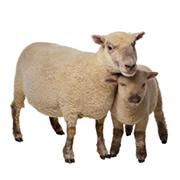 Could sheep pass a fatal brain disease between them through their milk?© Getty
Could sheep pass a fatal brain disease between them through their milk?© GettyThe inflamed mammary glands of sheep have been found to contain protein particles that cause scrapie, a sickness similar to mad cow disease. This suggests that the suspect proteins, called prions, may also be present in the milk of infected animals.
If prions exist in the milk of cows infected with both an inflammatory illness and mad cow disease, formally known as bovine spongiform encephalopathy (BSE), this raises concerns for human health. Consumption of prion-contaminated meat from cows with BSE is believed to cause the fatal variant Creutzfeldt-Jakob disease (vCJD) in people; so might contaminated milk.
Adriano Aguzzi, the lead researcher on the study, has not detected prions in milk itself, because it is difficult to analyse for the abnormal proteins. But he says he expects to find them.
“This raises very serious questions that need to be answered.”
Neil Cashman
University of British Columbia, Vancouver
"It is unlikely that the prions are not in the milk," says Aguzzi, a pathologist at the University of Zurich Hospital, Switzerland. "And the prospect is not a pleasant one."
Neil Cashman, a prion researcher at the University of British Columbia in Vancouver, is worried too. People have looked for prions in the milk of cows with BSE and haven't found any, he says. "But they haven't looked in cows with mammary-gland infection and BSE."
"This raises very serious questions," concludes Cashman.
Inflamed in the brain
Prions are mainly found in the brain, spinal cord and immune system. Until recently, other body parts were thought to be relatively safe. But in a series of studies, Aguzzi's group has shown that prions can be present in other organs as well, provided that these organs are inflamed.
Earlier this year, his group found prions in inflamed pancreases, livers and kidneys. A study last month showed that the urine produced by inflamed kidneys in mice also contains prions.
All this has helped to solve the mystery of how wild herds of elk and deer, which are vegetarian, might manage to contract prion diseases from each other. And it prompted Aguzzi to look at mammary glands to see if they could carry prions too.
Viral culprit?
ADVERTISEMENT
The researchers went to Sardinia, a Mediterranean island with more than a million sheep, and analysed 261 sheep that were genetically susceptible to scrapie. Of those, seven had scrapie, and four also had an infection of their mammary glands. All these four had prions in their mammary glands; the others did not. The study appears this week in Nature Medicine1.
The mammary-gland infections were caused by a virus called Maedi Visna. Aguzzi says that if this prion-virus combination is common, it may be a clue to how to fight the transmission of scrapie. "Maybe to eradicate scrapie you have to eradicate the virus first," Aguzzi says.
The prion concentration in the sheep's mammary glands is thousands of times lower than in the brain, says Aguzzi. This is probably good news, although it is not known how many prions it takes to cause vCJD in humans.
University of British Columbia, Vancouver
-
References
- LigiosC., et al. Nature Medicine, 11. 1137 - 1138 (2005). | Article |
